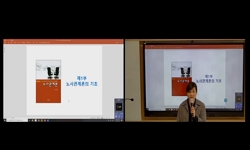From the perspective of Michel Foucault's knowledge/power, this study examines the power effects of Certified Public Labor Attorney(CPLA) on labor issues in the process of establishing the profession of CPLA, which emergedin response to the explosive ...
http://chineseinput.net/에서 pinyin(병음)방식으로 중국어를 변환할 수 있습니다.
변환된 중국어를 복사하여 사용하시면 됩니다.
- 中文 을 입력하시려면 zhongwen을 입력하시고 space를누르시면됩니다.
- 北京 을 입력하시려면 beijing을 입력하시고 space를 누르시면 됩니다.

단결권을 법 밖으로 밀어내기: 1987년 대투쟁 이후 노무사 직종의 정착과정을 중심으로 = Pushing the Right to Organize outside the Law: focusing on the settlement process of Certified Public Labor Attorney' profession after the Great Labor Struggle of 1987
한글로보기부가정보
다국어 초록 (Multilingual Abstract)
From the perspective of Michel Foucault's knowledge/power, this study examines the power effects of Certified Public Labor Attorney(CPLA) on labor issues in the process of establishing the profession of CPLA, which emergedin response to the explosive demand for knowledge about labor after the 1987 Great Labor Struggle. The first CPLA were graduated in 1987, and contrary to the expectation that they would become a promising professionin line with the modernization of labor management, they were a crisis profession with few places to find them, leading to abolitionism. The Great Labor Struggle of July-September 1987, in which more than 3,000 labordisputes occurred nationwide, was an opportunity to change the perspective of Korean companies that considered labor management as wasteful. Laborers became an essential part of the workforce, earning large profits and beingclassified as a high-income occupation. Although CPLA could provide practical and legal assistance to workers in matters such as industrial accidents, wage arrears, and unfair dismissal, their assistance was mainly focused on individualworkers' problems. At that time, legal advice on the exercise of the right to organize, such as labor disputes, was a ground for detention under the “prohibition of the third party intervention” in Article 13(2) of the Labor Dispute Adjustment Act. In the end, the establishment of CPLA profession was a process of closely linking labor issues and the law to facilitate the relief of individual workers' legal rights, but it was also a process of reproducing the problematization of labour disputes by isolating the right to organize and the channel of the law.
동일학술지(권/호) 다른 논문
-
버지니아공대 총격사건(2007)의 파장, 이민 한인의 정체성과 애환 그리고 애도의 불/가능성: 임재희, 『세 개의 빛』(2023)
- 전남대학교 5.18연구소
- 이행선
- 2024
- KCI등재
-
탈진실의 시대, 5・18의 진실을 다시 묻기: 5・18조사위 진상규명 활동에 대한 성찰적 비판
- 전남대학교 5.18연구소
- 김희송
- 2024
- KCI등재
-
- 전남대학교 5.18연구소
- 이규홍
- 2024
- KCI등재
-
- 전남대학교 5.18연구소
- 이정은
- 2024
- KCI등재




 DBpia
DBpia







